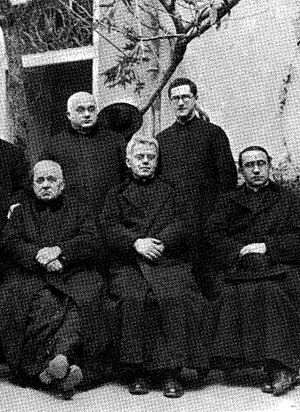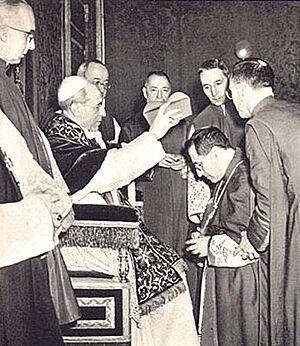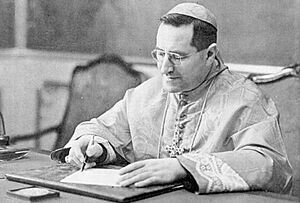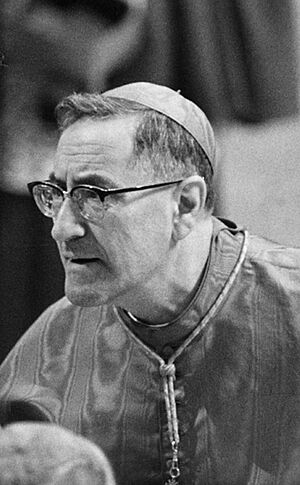Giuseppe Siri facts for kids
Quick facts for kids His Eminence Giuseppe Siri |
|
|---|---|
| Cardinal, Archbishop of Genoa | |
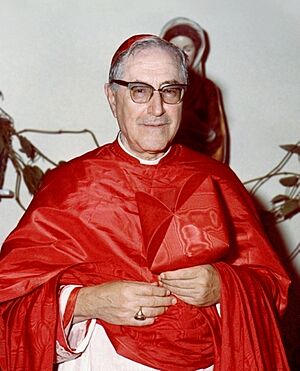
Cardinal Siri in the 1970s
|
|
| Archdiocese | Genoa |
| See | Genoa |
| Appointed | 14 May 1946 |
| Enthroned | 29 May 1946 |
| Reign ended | 6 July 1987 |
| Predecessor | Pietro Boetto |
| Successor | Giovanni Canestri |
| Other posts | Cardinal-Priest of Santa Maria della Vittoria (1953–89) |
| Orders | |
| Ordination | 22 September 1928 |
| Consecration | 7 May 1944 by Pietro Boetto |
| Created Cardinal | 12 January 1953 |
| Rank | Cardinal-priest |
| Personal details | |
| Birth name | Giuseppe Siri |
| Born | 20 May 1906 Genoa, Kingdom of Italy |
| Died | 2 May 1989 (aged 82) Genoa, Italy |
| Nationality | Italian |
| Denomination | Roman Catholic |
| Previous post |
|
| Alma mater | Pontifical Gregorian University |
| Motto | Non Nobis Domine (Not to Us, Lord) — Psalm 115:1 |
| Coat of arms |  |
Giuseppe Siri (born May 20, 1906 – died May 2, 1989) was an important Italian cardinal in the Catholic Church. He served as the Archbishop of Genoa for many years, from 1946 to 1987. In 1953, he was made a cardinal. He was a close associate of Pope Pius XII and was even considered a possible future Pope himself.
Contents
Early Life and Education
Giuseppe Siri was born in Genoa, Italy. His parents were Nicolò and Giulia Siri. He started his religious studies at a young age, entering the minor seminary in Genoa in 1916. He continued his studies at the major seminary from 1917 to 1926.
Later, Siri went to the Pontifical Gregorian University in Rome. He became a priest on September 22, 1928. After finishing his studies, he earned a high degree in theology. He also worked in a local church in Rome until 1929.
When he returned to Genoa, he worked as a chaplain. In 1930, he became a professor of theology at the major seminary. He also taught religion at local high schools from 1931 to 1936.
Becoming a Bishop and Cardinal
On March 14, 1944, Pope Pius XII chose Siri to be an Auxiliary Bishop of Genoa. This meant he would help the main bishop. He officially became a bishop on May 7, 1944.
During World War II, Siri played an important role in the Italian resistance movement. He talked with the Nazi forces who had surrounded Genoa. He also met secretly with leaders of the resistance fighters. Because of his efforts, the Nazis surrendered, which helped prevent more bombardment of the city.
After the previous Archbishop of Genoa passed away, Siri was chosen to be the new Archbishop on May 14, 1946. He officially took on this role on May 29, 1946.
In 1953, Pope Pius XII made him a Cardinal. At that time, he was the youngest cardinal in the College of Cardinals. He was sometimes called the "minestrone cardinal" because he helped people by providing food at soup kitchens.
Role in the Church
Cardinal Siri was known for his traditional views. He was part of the Second Vatican Council (1962–1965), a very important meeting that discussed changes in the Catholic Church. He was on the council's main board. He was also part of a group of traditionalist leaders. However, Siri once said he was an "independent" and didn't belong to any specific group.
In 1959, Pope John XXIII made Siri the first president of the Italian Bishops' Conference. He held this position until 1965.
Siri was a cardinal elector in four papal elections: in 1958, 1963, and twice in 1978. He was a strong candidate to become Pope in all these elections. His support mainly came from cardinals who held more traditional views.
Some news reports suggested that Siri received the most votes in the first round of the August 1978 election. However, Albino Luciani was eventually chosen as Pope. After Pope John Paul I died, Siri was again a leading traditional candidate. In the end, Cardinal Wojtyła was chosen as a compromise.
Siri was a friend of Archbishop Marcel Lefebvre. However, Siri did not agree with Lefebvre's actions that led to him breaking away from the Church. Siri even begged him not to separate from Rome.
Cardinal Siri retired from his position in Genoa on July 6, 1987, after 41 years of service. He passed away in Genoa at the age of 82. He was buried in the San Lorenzo metropolitan cathedral in Genoa.
Conclave Speculation
After the death of Pius XII in 1958, there was a papal election. On the first day, white smoke was seen from the chimney of the Sistine Chapel. This usually means a Pope has been elected. However, no announcement was made, and the smoke later turned black.
Years later, some people began to believe that Siri had actually been elected Pope in 1958. They claimed he was forced to refuse the role because of threats. However, Siri himself never made these claims. He always accepted the authority of all the Popes during his lifetime. He continued to serve the Church under them.
See also
 In Spanish: Giuseppe Siri para niños
In Spanish: Giuseppe Siri para niños
- Cardinal electors in Papal conclave, 1958
- Cardinal electors in Papal conclave, 1963
- Cardinal electors in Papal conclaves, August and October 1978
Images for kids


